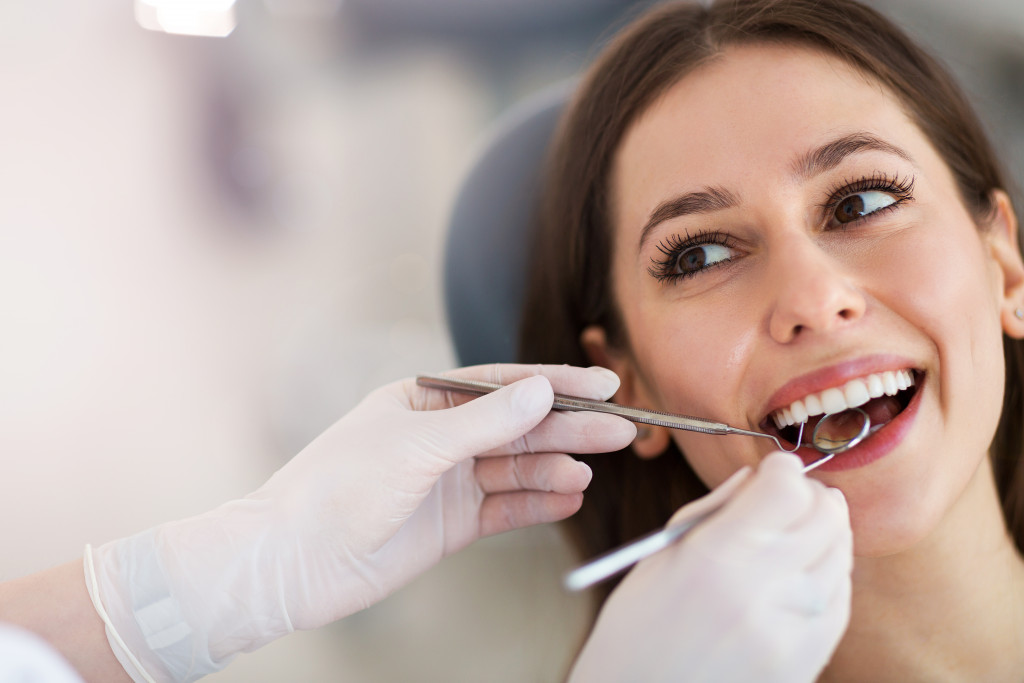- Maintaining oral health involves proper oral hygiene practices like brushing twice daily and flossing at least once daily.
- A balanced diet of essential nutrients and staying hydrated can significantly improve oral health.
- Avoiding tobacco in all forms is instrumental in preventing dental issues, including oral cancer.
- A suitable mouthwash can complement brushing and flossing, helping combat plaque and gum disease.
Maintaining your oral health is crucial for a radiant smile and overall wellness. This article will explore the best ways to keep your mouth healthy and prevent dental issues. These strategies are simple, from regular brushing and flossing to balanced nutrition and routine dental check-ups, but they can significantly improve your oral well-being. Dive in!
Proper Oral Hygiene
Maintaining proper oral hygiene is the foundation of good dental health. Here are some of the best habits to incorporate into your daily routine:
Regular Brushing
Brushing your teeth twice daily is one of the most effective ways to maintain oral hygiene. This simple habit significantly reduces plaque accumulation and helps prevent tooth decay and gum diseases. For best results, use a soft-bristled toothbrush and fluoride toothpaste, which helps strengthen tooth enamel and reduce the risk of decay.
Spend at least two minutes brushing, ensuring you cover all surfaces of your teeth – that means front, back, and chewing surfaces. Replacing your toothbrush every three to four months, or sooner if bristles become frayed, ensures you’re effectively cleaning your teeth.
Remember, brushing alone only cleans about 60% of tooth surfaces, so don’t forget the importance of flossing to reach those hard-to-clean spaces between teeth! Maintaining this routine is a crucial part of good oral hygiene.
Flossing Daily

Flossing daily is an essential part of an effective oral health routine. Many people overlook flossing, but it is crucial in preventing oral issues. Regular flossing removes plaque buildup and food particles between your teeth and underneath the gum line – unreachable areas with a regular toothbrush.
This helps to prevent gum diseases, tooth decay, and bad breath. According to the American Dental Association, you should floss at least once a day, using about 18 inches of dental floss. Ensure you use a clean section of the floss for each tooth, and follow the natural curve of your teeth to avoid damaging your gums.
Consider using a floss pick, interdental brushes, or water flossing tools if you find traditional floss difficult. Like brushing, consistency is key when it comes to flossing. Remember, good oral hygiene is not complete without daily flossing!
Balanced Nutrition
Maintaining a balanced diet is another key aspect of oral health. Foods high in sugars and carbohydrates can promote tooth decay, while those rich in calcium, phosphorus, and vitamin C can help to protect and restore tooth enamel and gum health. Dairy products like cheese and yogurt, leafy greens, fish, and lean proteins are great examples of tooth-friendly foods.
Whole fruits and vegetables, especially crunchy ones like apples and carrots, can help clean your teeth naturally and stimulate saliva production, neutralizing harmful acids. Hydration is also important – not only does water contribute to overall health, but it also cleanses the mouth and helps fight against dry mouth.
Remember, while diet is a crucial part of oral health, it’s not a replacement for regular brushing and flossing. Always maintain a balanced diet and routine oral hygiene for optimal dental health.
Avoiding Tobacco
Avoiding tobacco in any form is paramount for maintaining good oral health. Smoking or chewing tobacco can lead to numerous dental problems, including stained teeth, bad breath, diminished sense of taste and smell, gum disease, and oral cancer. The harmful chemicals in tobacco can damage your gums, making them more susceptible to infection, leading to periodontal disease.
In addition, smoking reduces the blood flow and supply of vital nutrients to your gums, affecting wound healing and making smokers more prone to infections and delayed wound healing after oral surgeries or tooth extraction. Thus, quitting tobacco is important to protect oral health and ensure a radiant and healthy smile.
Using Mouthwash
Using mouthwash is an excellent addition to your oral hygiene routine. A good mouthwash leaves your breath fresh and can help prevent dental issues. Antiseptic mouthwashes can kill bacteria that cause plaque, gum disease, and bad breath.
Fluoride-containing mouthwashes can help decelerate enamel erosion and prevent tooth decay. However, it’s important to note that mouthwash is not a replacement for brushing and flossing, but an adjunctive measure.
Also, consult your dentist before starting a mouthwash routine; they can recommend the best mouthwash that suits your oral health needs. Remember, for best results, don’t eat or drink for 30 minutes after using a fluoride mouthwash to allow the fluoride to fully bind to your teeth. Regular use of mouthwash, in conjunction with proper brushing and flossing, will contribute significantly to maintaining your oral health.
Visit a General Dentistry Clinic

Regular general dentistry clinic visits are vital for optimal oral health. Dentists and oral hygienists provide essential preventive care such as deep cleanings, examinations, and X-rays to monitor your teeth and gums for potential issues.
Early detection of problems like cavities, gum disease, or oral cancer often results in simpler and more successful treatment options. Not only can a dentist identify and treat oral issues, but they can also provide personalized advice on how to improve your home oral care routine based on your unique needs.
General dentistry clinics can also offer services such as tooth extractions, root canals, and fillings, ensuring comprehensive care for your oral health. Hence, visiting a general dentistry clinic for a check-up at least once every six months is recommended, or as your dental professional recommends.
Don’t overlook these simple, yet impactful habits. Remember, you have the power to protect your radiant smile. Start today, and take a step towards a healthier you!

